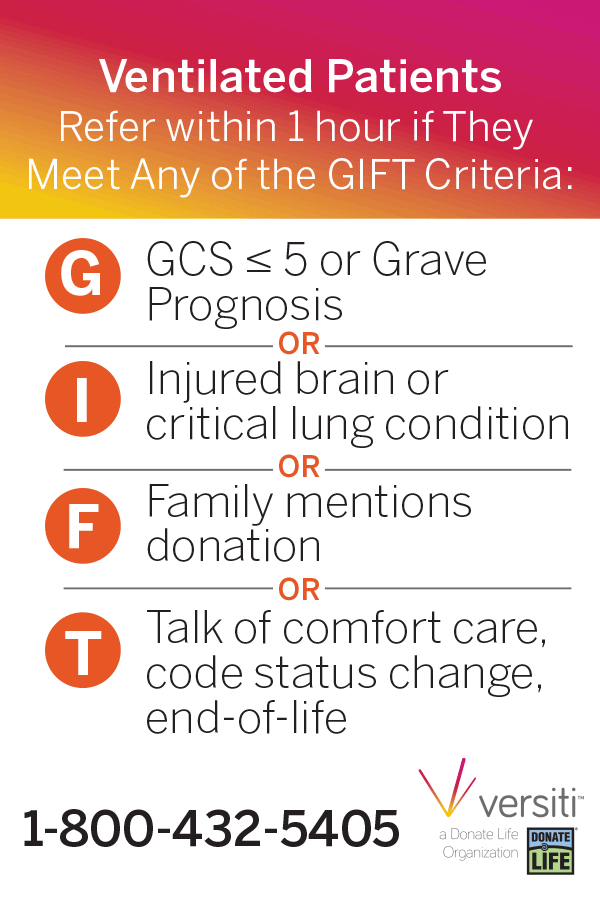Hospital and Medical Partners
With your help, we can serve Wisconsin patients who desperately need organ and tissue transplants.
DBD donors are ventilated patients who have suffered severe neurological injuries and have been declared dead by neurological criteria.
DCD donors are ventilated patients who have suffered severe injuries but have some brain stem reflexes intact, therefore not meeting brain death criteria. These patients have poor prognoses and would not be able to sustain life without external support. The decision has been made to transition to withdraw life-sustaining therapies, including ventilator support.
- Heart
- Intestines
- Kidneys
- Liver
- Lungs
- Pancreas
- Bone: used to treat patients with orthopedic cancers, damaged spines and damaged joints
- Tendons and ligaments: used for joint reconstruction and repair of sports injuries
- Skin: used to treat burns, for breast reconstructions following mastectomies, and for wound treatment
- Veins and arteries: used to treat those suffering from diabetes and vascular diseases
- Heart valves: used to repair damaged or diseased heart valves
- Corneas: used to replace damaged or diseased corneas to improve eyesight
Accreditations & Licenses
Versiti and its affiliates hold numerous accreditations and licenses, listed here for each Versiti affiliate.
Glasgow Coma Scale
Guide to the Glasgow Coma Scale (GCS): history, scoring, and clinical use in assessing brain injury and patient consciousness.
Medical Examiner and Coroner Resources
Organ and tissue donation processes and resources for medical examiners and coroners.
Funeral Home Resources
Versiti Organ and Tissue provides resources for funeral homes managing deceased individuals who have given the gift of life through organ and tissue donation.
Brain Death Testing Resources
Refer to this published article on Pediatric and Adult Brain/Death by Nerologic Criteria for consensus guidelines.
Medical Examiner and Coroner Resources
Organ and tissue donation processes and resources for medical examiners and coroners.
Funeral Home Resources
Versiti Organ and Tissue provides resources for funeral homes managing deceased individuals who have given the gift of life through organ and tissue donation.
Only Versiti staff will discuss donation with family or legal next of kin, unless otherwise instructed.
Versiti follows United Network for Organ Sharing (UNOS) matching per federal legislation. Recipients and donors are matched based on medical factors including blood type, HLA typing, body size, etc. These medical attributes are entered into an algorithm that provides potential recipients that have the best chance of long-term survival. Potential recipients are organized into a list based on how sick they are and how close their transplant center is to the donor hospital.
You may be told the region in the U.S. where organs were transplanted; however, we cannot share the exact location or transplant center.
Yes. All ventilated patients who meet clinical triggers need to be referred to Versiti within one hour of the patient meeting the clinical trigger. Referrals are necessary even if patients will be transferred to another unit or out of the hospital. Versiti always hopes that patients improve and are positively extubated; however, as the organ procurement organization, we must evaluate all donation potential in real time so that we are prepared for the time-sensitive process of donation.
Versiti will follow in the background until the patient improves, is no longer a candidate, or the time arises for a donation conversation with the patient’s next of kin. A Versiti staff member will check in every day to monitor neurological status, family plan and overall patient condition. It is the hospital’s responsibility to update Versiti if a patient loses neurological reflexes, their condition worsens, or if family/medical plan of care changes.
